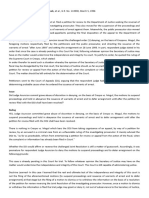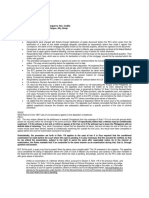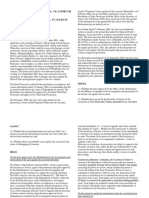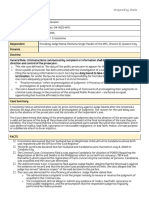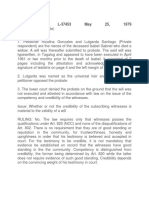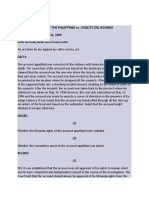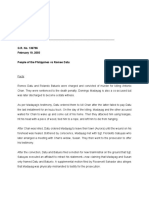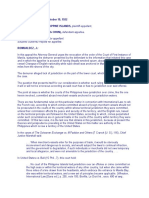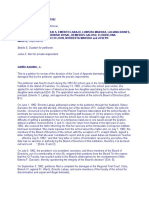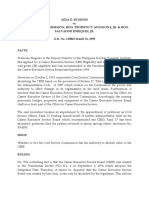CD 116. Villaflor v. Summers, 41 Phil. 62 (1920)
CD 116. Villaflor v. Summers, 41 Phil. 62 (1920)
Uploaded by
JMae MagatCopyright:
Available Formats
CD 116. Villaflor v. Summers, 41 Phil. 62 (1920)
CD 116. Villaflor v. Summers, 41 Phil. 62 (1920)
Uploaded by
JMae MagatOriginal Description:
Copyright
Available Formats
Share this document
Did you find this document useful?
Is this content inappropriate?
Copyright:
Available Formats
CD 116. Villaflor v. Summers, 41 Phil. 62 (1920)
CD 116. Villaflor v. Summers, 41 Phil. 62 (1920)
Uploaded by
JMae MagatCopyright:
Available Formats
Right Against Self-incrimination
G.R. No. 16444 September 8, 1920
EMETERIA VILLAFLOR, petitioner,
vs.
RICARDO SUMMERS, sheriff of the City of Manila, respondent.
Facts: The facts are not dispute. In a criminal case pending before the Court of First Instance of the city of Manila, Emeteria Villaflor and Florentino
Souingco are charged with the crime of adultery. On this case coming on for trial before the Hon. Pedro Concepcion, Judge of First Instance, upon
the petitioner of the assistant fiscal for the city of Manila, the court ordered the defendant Emeteria Villaflor, nor become the petitioner herein, to
submit her body to the examination of one or two competent doctors to determine if she was pregnant or not. The accused refused to obey the order
on the ground that such examination of her person was a violation of the constitutional provision relating to self-incrimination. Thereupon she was
found in contempt of court and was ordered to be committed to Bilibid Prison until she should permit the medical examination required by the court.
ISSUE: WON the compelling of a woman to permit her body to be examined by physicians to determine if she is pregnant, violates that portion of
the Philippine Bill of Rights and that portion of our Code of Criminal Procedure which find their origin in the Constitution
Ruling: NO.
In contradistinction to the cases above-mentioned are others which seem to us more progressive in nature. Among these can be prominently
mentioned decisions of the United States Supreme Court, and the Supreme Court of these Islands. Thus, the always forward looking jurist, Mr.
Justice Holmes, in the late case of Holt vs. United States ([1910], 218 U. S., 245), in resolving an objection based upon what he termed "an
extravagant extension of the Fifth Amendment," said: "The prohibition of compelling a man in a criminal court to be a witness against himself is a
prohibition of the use of physical or moral compulsion to extort communications from him, not an exclusion of his body as evidence when it may be
material." The Supreme Court of the Philippine Islands, in two decisions, has seemed to limit the protection to a prohibition against compulsory
testimonial self-incrimination.
Perhaps the best way to test the correctness of our position is to go back once more to elements and ponder on what is the prime purpose of a criminal
trial. As we view it, the object of having criminal laws is to purgue the community of persons who violate the laws to the great prejudice of their
fellow men. Criminal procedure, the rules of evidence, and constitutional provisions, are then provided, not to protect the guilty but to protect the
innocent. No rule is intemended to be so rigid as to embarrass the administration of justice in its endeavor to ascertain the truth. No accused person
should be afraid of the use of any method which will tend to establish the truth. For instance, under the facts before us, to use torture to make the
defendant admit her guilt might only result in including her to tell a falsehood. But no evidence of physical facts can for any substantial reason be
held to be detrimental to the accused except in so far as the truth is to be avoided in order to acquit a guilty person.
Obviously a stirring plea can be made showing that under the due process of law cause of the Constitution every person has a natural and inherent
right to the possession and control of his own body. It is extremely abhorrent to one's sense of decency and propriety to have the decide that such
inviolability of the person, particularly of a woman, can be invaded by exposure to another's gaze. As Mr. Justice Gray in Union Pacific Railway
Co. vs. Botsford ([1891], 141 U. S., 250) said, "To compel any one, and especially a woman, to lay bare the body, or to submit to the touch of a
stranger, without lawful authority, is an indignity, an assault, and a trespass." Conceded, and yet, as well suggested by the same court, even superior
to the complete immunity of a person to be let alone is the inherent which the public has in the orderly administration of justice. Unfortunately, all
too frequently the modesty of witnesses is shocked by forcing them to answer, without any mental evasion, questions which are put to them; and such
a tendency to degrade the witness in public estimation does not exempt him from the duty of disclosure. Between a sacrifice of the ascertainment of
truth to personal considerations, between a disregard of the public welfare for refined notions of delicacy, law and justice cannot hesitate.
Fully conscious that we are resolving a most extreme case in a sense, which on first impression is a shock to one's sensibilities, we must nevertheless
enforce the constitutional provision in this jurisdiction in accord with the policy and reason thereof, undeterred by merely sentimental influences.
Once again we lay down the rule that the constitutional guaranty, that no person shall be compelled in any criminal case to be a witness against
himself, is limited to a prohibition against compulsory testimonial self-incrimination. The corollary to the proposition is that, an ocular inspection
of the body of the accused is permissible. The proviso is that torture of force shall be avoided. Whether facts fall within or without the rule
with its corollary and proviso must, of course, be decided as cases arise.
It is a reasonable presumption that in an examination by reputable and disinterested physicians due care will be taken not to use violence and not to
embarass the patient any more than is absolutely necessary. Indeed, no objection to the physical examination being made by the family doctor of the
accused or by doctor of the same sex can be seen.
Although the order of the trial judge, acceding to the request of the assistant fiscal for an examination of the person of the defendant by physicians
was phrased in absolute terms, it should, nevertheless, be understood as subject to the limitations herein mentioned, and therefore legal. The writ of
habeas corpus prayed for is hereby denied. The costs shall be taxed against the petitioner. So ordered.
You might also like
- Paul G. Roberts, Et Al. v. CADocument2 pagesPaul G. Roberts, Et Al. v. CAManar H. MacapodiNo ratings yet
- Test Bank For Business Law Today Comprehensive 12th Edition Roger Leroy Miller 1Document12 pagesTest Bank For Business Law Today Comprehensive 12th Edition Roger Leroy Miller 1Jordan Murphy100% (47)
- Case Folder Inventory: Louisiana State Police Bureau of Investigation West District DetectivesDocument60 pagesCase Folder Inventory: Louisiana State Police Bureau of Investigation West District DetectivesEthan Brown0% (1)
- In Re Salibo v. Warden, G.R. No. 197597, 8 April 2015Document3 pagesIn Re Salibo v. Warden, G.R. No. 197597, 8 April 2015Maria KrungNo ratings yet
- National Housing Authority Vs Court of Appeals, Et - Al.: G.R. No. 148830 April 13, 2005 Public LandDocument6 pagesNational Housing Authority Vs Court of Appeals, Et - Al.: G.R. No. 148830 April 13, 2005 Public LandAnsaiMendozaNo ratings yet
- 3.Pp v. Hipona - DigestDocument1 page3.Pp v. Hipona - Digestarsalle2014No ratings yet
- III - Rule 116 (2) People V DocumentoDocument1 pageIII - Rule 116 (2) People V DocumentoBananaNo ratings yet
- Gandioco V PenarandaDocument2 pagesGandioco V PenarandaSocNo ratings yet
- Spouses Aldaba Vs Leonora RimandoDocument5 pagesSpouses Aldaba Vs Leonora RimandoRuel FernandezNo ratings yet
- Calang Vs P, G.R. No. 190696. August 3, 2010Document7 pagesCalang Vs P, G.R. No. 190696. August 3, 2010Diana AtienzaNo ratings yet
- 20.-Mclaughlin V CADocument2 pages20.-Mclaughlin V CAFender BoyangNo ratings yet
- Haaays Ulit Na NamanDocument65 pagesHaaays Ulit Na NamanWilfredo Guerrero IIINo ratings yet
- Republic vs. Estate of Hans Menzi GR No. 152578 PDFDocument5 pagesRepublic vs. Estate of Hans Menzi GR No. 152578 PDFMenchie E. Dela CruzNo ratings yet
- Braza v. SandiganbayanDocument30 pagesBraza v. SandiganbayanKian FajardoNo ratings yet
- Antiporda JR v. GarchitorenaDocument1 pageAntiporda JR v. GarchitorenaShella Hannah SalihNo ratings yet
- Vda de Manguerra Vs RisosDocument2 pagesVda de Manguerra Vs RisosGillian Caye Geniza BrionesNo ratings yet
- People vs. Jack Racho G.R. No. 186529 August 3, 2010 FactsDocument1 pagePeople vs. Jack Racho G.R. No. 186529 August 3, 2010 Factslou annNo ratings yet
- Navarro vs. Court of Appeals - Rule 124Document1 pageNavarro vs. Court of Appeals - Rule 124Grandeureign OrtizoNo ratings yet
- Ramirez Vs People, GR No 197832, October 2, 2013Document2 pagesRamirez Vs People, GR No 197832, October 2, 2013Maya07100% (1)
- Simon A. Flores v. People of The PhilippinesDocument2 pagesSimon A. Flores v. People of The PhilippinesStardustNo ratings yet
- COA v. Ferrer G.R. No. 218870Document7 pagesCOA v. Ferrer G.R. No. 218870Emer May BalleteNo ratings yet
- Lumanlaw v. Peralta, JR., G.R. No. 164953Document9 pagesLumanlaw v. Peralta, JR., G.R. No. 164953Jo ParagguaNo ratings yet
- Paderanga v. DrilonDocument2 pagesPaderanga v. DrilonAgee Romero-ValdesNo ratings yet
- Topic Date: Criminal Procedure 2EDocument2 pagesTopic Date: Criminal Procedure 2EJasenNo ratings yet
- Case Doctrines From Condo Act To NuisanceDocument16 pagesCase Doctrines From Condo Act To NuisanceJerome LeañoNo ratings yet
- Mendoza VS PeopleDocument2 pagesMendoza VS PeopleLloyd David P. VicedoNo ratings yet
- 13 - Republic v. CADocument3 pages13 - Republic v. CAAbigael SeverinoNo ratings yet
- #30 Consigna v. People, GR 175750-51, April 2, 2014 FactsDocument2 pages#30 Consigna v. People, GR 175750-51, April 2, 2014 FactsRoselle LagamayoNo ratings yet
- PEOPLE OF THE PHILIPPINES, Plaintiff-Appellee, v. ALVIN FATALLO Y ALECARTE Accused-AppellantDocument2 pagesPEOPLE OF THE PHILIPPINES, Plaintiff-Appellee, v. ALVIN FATALLO Y ALECARTE Accused-AppellantCharles Bay0% (1)
- Pangan Vs GarbaliteDocument2 pagesPangan Vs GarbaliteJaz SumalinogNo ratings yet
- People V OandasanDocument3 pagesPeople V OandasanMarcelino EnriquezNo ratings yet
- Coscolluela V SBDocument3 pagesCoscolluela V SBJenny A. BignayanNo ratings yet
- Article III, Section 14 Right To Confrontation, To Cross-Examine, or To Meet Witness Face To Face (1462) People v. DignoDocument1 pageArticle III, Section 14 Right To Confrontation, To Cross-Examine, or To Meet Witness Face To Face (1462) People v. DignoMichelle DecedaNo ratings yet
- LRTA V NavidadDocument1 pageLRTA V NavidadKokong TagalogNo ratings yet
- People and Photokina vs. Benipayo (G.r. No. 155573 April 24, 2009)Document1 pagePeople and Photokina vs. Benipayo (G.r. No. 155573 April 24, 2009)MeAnn TumbagaNo ratings yet
- Acharon v. Purisima, G.R. No. L-23731, February 26, 1965Document1 pageAcharon v. Purisima, G.R. No. L-23731, February 26, 1965mae ann rodolfoNo ratings yet
- DIGEST Reyes v. ManginoDocument1 pageDIGEST Reyes v. ManginoCamille Espeleta100% (1)
- Labao v. Flores G.R. No. 187984Document5 pagesLabao v. Flores G.R. No. 187984Emer May BalleteNo ratings yet
- 98 Phil 698,193 Scra 152, 38 Phil 330Document4 pages98 Phil 698,193 Scra 152, 38 Phil 330RenChaNo ratings yet
- Case Digest Habeas Corpus of Azucena LDocument1 pageCase Digest Habeas Corpus of Azucena LMadel Malone-CervantesNo ratings yet
- Obosa v. CA - OdtDocument2 pagesObosa v. CA - OdtAnonymous 6Xc2R53xNo ratings yet
- Lopez V ErictaDocument18 pagesLopez V ErictaKirsten Denise B. Habawel-VegaNo ratings yet
- Dy v. PeopleDocument2 pagesDy v. PeopleHezroNo ratings yet
- Aliwaya DigestDocument3 pagesAliwaya DigestCharlie BartolomeNo ratings yet
- 2.6 Re Crisostomo v. SinghDocument3 pages2.6 Re Crisostomo v. SinghSheila Faith FajaritoNo ratings yet
- RULE 115 - Perez v. PeopleDocument1 pageRULE 115 - Perez v. PeoplebeaenriquezNo ratings yet
- Guerrero, J. (Ponente) : Gonzales v. CA G.R. No. L-37453 May 25, 1979Document1 pageGuerrero, J. (Ponente) : Gonzales v. CA G.R. No. L-37453 May 25, 1979Hazel LunaNo ratings yet
- Case Digest Rem 2Document53 pagesCase Digest Rem 2Cza PeñaNo ratings yet
- CRIM LAW 2 - Integrated Bar of The Philippines Pangasinan Legal Aid vs. Department of JusticeDocument1 pageCRIM LAW 2 - Integrated Bar of The Philippines Pangasinan Legal Aid vs. Department of JusticeRVillanuevaNo ratings yet
- Visbal v. VanillaDocument1 pageVisbal v. VanillaRidzanna AbdulgafurNo ratings yet
- 37 Prudente Soller, Et. AL. vs. SandiganbayanDocument1 page37 Prudente Soller, Et. AL. vs. SandiganbayanHiroshi Carlos100% (1)
- BLANCO Module 4 DigestsDocument5 pagesBLANCO Module 4 DigestsCacapablen GinNo ratings yet
- People v. Pangilinan (Arraignment)Document2 pagesPeople v. Pangilinan (Arraignment)adrianmdelacruzNo ratings yet
- Remrev DigestDocument12 pagesRemrev DigestEddieNo ratings yet
- Rotea V Halili 111Document2 pagesRotea V Halili 111Tiff DizonNo ratings yet
- 3 1 Perez V MadronaDocument1 page3 1 Perez V MadronaBeeya EchauzNo ratings yet
- Case Digest 3Document36 pagesCase Digest 3Mellie MorcozoNo ratings yet
- People Vs Pangilinan G R 171020 March 14 2007Document1 pagePeople Vs Pangilinan G R 171020 March 14 2007qweqeqweqweNo ratings yet
- Phil Rabbit Vs People DigestDocument1 pagePhil Rabbit Vs People DigestVernis VentilacionNo ratings yet
- Castillo V VillaluzDocument1 pageCastillo V VillaluzJorela TipanNo ratings yet
- GR No. 158763 March 31, 2016 Jose C. Miranda, Alberto P. Dalmacio and Romeo B. Ocon vs. Virgilio M. Tuliao FactsDocument2 pagesGR No. 158763 March 31, 2016 Jose C. Miranda, Alberto P. Dalmacio and Romeo B. Ocon vs. Virgilio M. Tuliao FactsAnalou Agustin VillezaNo ratings yet
- Villaflor Vs SummersDocument2 pagesVillaflor Vs SummersinvictusincNo ratings yet
- G. People v. Mariacos, G.R. No. 188611, 16 June 2010Document12 pagesG. People v. Mariacos, G.R. No. 188611, 16 June 2010JMae MagatNo ratings yet
- D. United States v. Go Chico, 14 Phil. 128 (1909)Document6 pagesD. United States v. Go Chico, 14 Phil. 128 (1909)JMae MagatNo ratings yet
- People v. Oanis, 74 Phil. 257 (1943)Document8 pagesPeople v. Oanis, 74 Phil. 257 (1943)JMae MagatNo ratings yet
- (Ii) People v. Faller, 67 Phil. 529 (1939)Document2 pages(Ii) People v. Faller, 67 Phil. 529 (1939)JMae MagatNo ratings yet
- (Iii) Quizon v. Justice of The Peace, G.R. No. L-6641, 28 July 1955Document4 pages(Iii) Quizon v. Justice of The Peace, G.R. No. L-6641, 28 July 1955JMae MagatNo ratings yet
- (I) Rollie Calimutan v. People, G.R. No. 152133, 9 February 2006Document2 pages(I) Rollie Calimutan v. People, G.R. No. 152133, 9 February 2006JMae MagatNo ratings yet
- B. Dandy L. Dungo v. People, G.R. No. 209464, 1 July 2015Document26 pagesB. Dandy L. Dungo v. People, G.R. No. 209464, 1 July 2015JMae MagatNo ratings yet
- United States v. Catolico, 18 Phil. 504 (1911)Document3 pagesUnited States v. Catolico, 18 Phil. 504 (1911)JMae MagatNo ratings yet
- People v. Lo-Lo & Saraw, 43 Phil. 19 (1922)Document3 pagesPeople v. Lo-Lo & Saraw, 43 Phil. 19 (1922)JMae MagatNo ratings yet
- People v. Delim, 396 SCRA 386 (2003)Document35 pagesPeople v. Delim, 396 SCRA 386 (2003)JMae MagatNo ratings yet
- United States v. Apostol, 14 Phil. 92 (1909)Document2 pagesUnited States v. Apostol, 14 Phil. 92 (1909)JMae MagatNo ratings yet
- People v. Wong Cheng, 46 Phil. 729 (1922)Document3 pagesPeople v. Wong Cheng, 46 Phil. 729 (1922)JMae MagatNo ratings yet
- United States v. Ah Sing, 36 Phil. 978 (1917)Document2 pagesUnited States v. Ah Sing, 36 Phil. 978 (1917)JMae MagatNo ratings yet
- Gonzales vs. PCIB (GR No. 180257, 23 February 2011)Document15 pagesGonzales vs. PCIB (GR No. 180257, 23 February 2011)JMae MagatNo ratings yet
- Garciano vs. CA (GR No. 96126, 10 August 1992)Document3 pagesGarciano vs. CA (GR No. 96126, 10 August 1992)JMae MagatNo ratings yet
- Ilocos Norte Electric v. CA (GR No. L-53401, 6 November 1989)Document9 pagesIlocos Norte Electric v. CA (GR No. L-53401, 6 November 1989)JMae MagatNo ratings yet
- People v. Ringor, 320 SCRA 342 (1999)Document7 pagesPeople v. Ringor, 320 SCRA 342 (1999)JMae MagatNo ratings yet
- Schneckenburger v. Moran, 63 Phil. 249 (1936)Document1 pageSchneckenburger v. Moran, 63 Phil. 249 (1936)JMae MagatNo ratings yet
- Serra vs. Mumar (GR No. 193861, 14 March 2012)Document7 pagesSerra vs. Mumar (GR No. 193861, 14 March 2012)JMae MagatNo ratings yet
- GSIS vs. Deang (GR No. 135644, 17 September 2001)Document4 pagesGSIS vs. Deang (GR No. 135644, 17 September 2001)JMae MagatNo ratings yet
- Gaid vs. People of The Philippines (GR No. 171636, 7 April 2009)Document5 pagesGaid vs. People of The Philippines (GR No. 171636, 7 April 2009)JMae Magat100% (1)
- Tamargo vs. CA (GR No. 85044, 3 June 1992)Document3 pagesTamargo vs. CA (GR No. 85044, 3 June 1992)JMae MagatNo ratings yet
- Franco-Cruz vs. CA (GR No. 172238, 17 September 2008)Document6 pagesFranco-Cruz vs. CA (GR No. 172238, 17 September 2008)JMae MagatNo ratings yet
- Kilusang Bayan V DominguezDocument2 pagesKilusang Bayan V DominguezAce Spade Seclon EspenidoNo ratings yet
- Panlungsod. Mayor Perez Also Stated That Del Castillo Has No Legal CapacityDocument5 pagesPanlungsod. Mayor Perez Also Stated That Del Castillo Has No Legal CapacityKCCNo ratings yet
- CHEUNG KEE FUNG CHEUNG CONSTRUCTION CO LTD v. PERMANENT INVESTMENT CO LTD HCCT000008 - 2016Document7 pagesCHEUNG KEE FUNG CHEUNG CONSTRUCTION CO LTD v. PERMANENT INVESTMENT CO LTD HCCT000008 - 2016Ping Hung TongNo ratings yet
- B.A. Ll.b. (2017 Pattern)Document10 pagesB.A. Ll.b. (2017 Pattern)shrutigund3No ratings yet
- Except by Analogy or in A Suppletory Character and Whenever Practicable and Convenient. Rule 1, Sec. 10Document22 pagesExcept by Analogy or in A Suppletory Character and Whenever Practicable and Convenient. Rule 1, Sec. 10audy ricardo100% (1)
- Codoy Vs CalugayDocument1 pageCodoy Vs CalugayJB100% (2)
- Criminal Appeal No. 230 of 2014Document11 pagesCriminal Appeal No. 230 of 2014DATIUS DIDACE(Amicus Curiae)⚖️No ratings yet
- Larin vs. Exec. SecretaryDocument23 pagesLarin vs. Exec. SecretaryeieipayadNo ratings yet
- Del Rosario v. Equitable Insurance Casualty Co.Document4 pagesDel Rosario v. Equitable Insurance Casualty Co.Shiela PilarNo ratings yet
- Law On Public Corp SyllabusDocument6 pagesLaw On Public Corp SyllabusAlvin Dela CruzNo ratings yet
- Ethelwoldo Fernandez vs. CA Justice Ramon Bato, Jr.,A.M. OCA IPI No. 12-201-CA-J, Feb. 19, 2013 - CANLASDocument5 pagesEthelwoldo Fernandez vs. CA Justice Ramon Bato, Jr.,A.M. OCA IPI No. 12-201-CA-J, Feb. 19, 2013 - CANLASEvander Arcenal0% (1)
- Entry of AppearanceDocument4 pagesEntry of AppearanceEnrico P. PapioNo ratings yet
- Pratibha Rani Vs Suraj KumarDocument4 pagesPratibha Rani Vs Suraj KumarjaishreeNo ratings yet
- Ujwala N Jagdale and Ors Vs Jagdale Industries PriNC201723061716192583COM45336-2Document2 pagesUjwala N Jagdale and Ors Vs Jagdale Industries PriNC201723061716192583COM45336-2Gandhi Jenny Rakeshkumar BD20029No ratings yet
- Banez Vs ValdevillaDocument2 pagesBanez Vs ValdevillaPatrizia Ann FelicianoNo ratings yet
- Pre-Trial Brief: Municipal Trial Court in CitiesDocument8 pagesPre-Trial Brief: Municipal Trial Court in CitiesJoyce Amara VosotrosNo ratings yet
- Offences and Penalties Relating To Trade MarksDocument9 pagesOffences and Penalties Relating To Trade MarksPoornima SubramaniNo ratings yet
- BUREAU OF FOOD AND DRUGS Vs DRUGMAKERS LABORATORIESDocument3 pagesBUREAU OF FOOD AND DRUGS Vs DRUGMAKERS LABORATORIESMarinelMarquezNo ratings yet
- Teddy Maravilla V Joseph RiosDocument4 pagesTeddy Maravilla V Joseph RiosJaydee VillamarNo ratings yet
- Death As A Cause of Action (Group 7)Document22 pagesDeath As A Cause of Action (Group 7)Prince IgbongidiNo ratings yet
- Digest Sangalang Vs IacDocument3 pagesDigest Sangalang Vs IacEbbe Dy100% (4)
- Aida D. Eugenio vs. Civil Service Commission, Hon. Teofisto T. Guingona, Jr. & Hon. Salvador Enriquez, Jr. G.R. No. 115863 March 31, 1995Document2 pagesAida D. Eugenio vs. Civil Service Commission, Hon. Teofisto T. Guingona, Jr. & Hon. Salvador Enriquez, Jr. G.R. No. 115863 March 31, 1995Russ TuazonNo ratings yet
- Romulo vs. Yniguez, G.R. No. 71908. February 4, 1986Document7 pagesRomulo vs. Yniguez, G.R. No. 71908. February 4, 1986Mary Divina FranciscoNo ratings yet
- AGENCE FRANCE PRESSE v. GOOGLE INC. - Document No. 34Document2 pagesAGENCE FRANCE PRESSE v. GOOGLE INC. - Document No. 34Justia.comNo ratings yet
- Default of Nominated Sub-Contractors PDFDocument2 pagesDefault of Nominated Sub-Contractors PDFKennith NgNo ratings yet
- Human Rights Case DigestsDocument19 pagesHuman Rights Case DigestsEduard Loberez ReyesNo ratings yet
- PIL Case DigestsDocument10 pagesPIL Case DigestsKim ZayatNo ratings yet
- Maturita Solutions 2nd Pre-Intermediate U 9A - Crime and Criminals Flashcards QuizletDocument1 pageMaturita Solutions 2nd Pre-Intermediate U 9A - Crime and Criminals Flashcards QuizletjuliNo ratings yet
